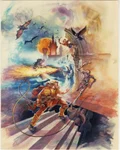Pretty simple: talk about retro styled games. By that I mean games with stricter punishments for failure, and generally are designed not as an experience expected to be finished, but a challenge meant to be conquered (or otherwise any game made 25+ years ago). I love these kinds of action games despite not being very good at them.
Talk about games you like / dislike, their developers and publishers, games you beat, parts you're stuck on, etc.
If you're into coin-op games you can boast your highscores and 1cc's here and challenge other anons to beat them
Console:
X
CLEAR CONSOLE
/vg/ - Video Games
166620981...jpg
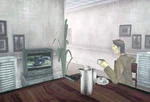
(27.51 KB
604x409
)

I don't think retro games were necessarily always designed to be "hardcore". By the thread's definitions Silent Hill can be included and it's definitely an experience intended to be finished. I do agree however that old games were more unforgiving in general.
>>53
I think retro games are merely for people who like games and are more dedicated. Some people want to have their handheld throughout a game, and that is exactly what retro games don't do. Games probably have become easier to move more units.
aitd.png
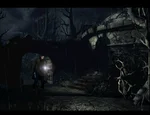
(329.03 KB
1405x1080
)

>>58
>Games probably have become easier to move more units.
Yeah, I can agree with that. Gaming has become a hugely lucrative industry. Just around 20 years ago gaming was mostly for nerds, by nerds. Now everyone plays video games so big companies like Bethesda realize that by making the game more accessible it will appeal to a wider audience, which means more sales. I think it's sad.
Talking about older games being more challenging, got a funny story. Last year I played Alone in the Dark: New Nightmare on a PS1 emulator. Great game, very classic horror atmosphere but still managed to be spooky.
I was about an hour into the first level and noticed the enemies were ramping up. My starting pistol was becoming pretty useless and I got this feeling that I should have discovered a better weapon by now. So I looked up a walkthrough and turns out I missed the shotgun. It was in an area that I had already passed through but I just fucking walked right past it without picking it up. Completely overlooked it. I tried going back but found the area inaccessible. I thought it was pretty funny that the game was merciless like that. "Oh, missed the shotgun, huh? Tough shit, pay attention next time." Made me realize I don't really see stuff like that in modern games.
That said, not all modern games are casualized. There are plenty of games today that offer a challenge. The Evil Within games are a good example. They were released in the 2010's but offer some brutal fucking difficulty.
Thoughts on retro Zelda games?
Z.png

(890.58 KB
2880x1080
)

>>98
Peak Zelda, without a doubt. When it comes to the 2D games I specially like the original for how simple it is.
But you can't mention retro Zelda without picking a side on the great debate
>>98 >>99
Personally I've only played the original nes one. It was alright, however when I realized I'd have to keep a map on paper to play it and then also heard that you must burn some random bush somewhere to progress I decided that I just wasn't going to finish it. I guess I should try the later ones someday. If I were to play just one, which would you recommend?
>>116
I beat the original zelda with a guide and that was even with all the knowledge i got from internet word of mouth. There's some cryptic shit in the first metroid, too, but I'm more forgiving of that since I was actually able to beat it on my own.
Anyways, despite zelda being a flagship nintendo series I've never been more than a casual fan. I know that each subsequent game gets a little more linear until they streamlined the 3d format, but I've played little of the series otherwise.
>>116
>>118
I didn't find it necessary to use a guide or keep a map for the original game. I did end up brute-forcing many secrets by bombing random walls and burning random bushes, but anything more difficult than that (e.g. Lost Woods navigation) has an NPC hint giving it away. The poorly translated nonsense hints ("TENTH ENEMY HAS THE BOMB") tend to be nonessential. I never found the magic key, though, so I ended up grinding rupees to buy keys from the shops for the final level.
The only other Zelda game I've played through is Link to the Past, and that one is much more straightforward in comparison. However, I find the puzzles to be more clever, as well. They follow a logical structure instead of being obscure and random. Earlier in this thread, it was said that modern games are not enjoyable because they are casualized, but I think some of the most successful and enduring retro games are the ones that take an existing formula and make it easier and more user-friendly. This is also the case with Super Metroid, which is an incredibly easy game, yet is often considered the peak of the series.
What makes these games different from casualized modern games is that they don't rely on removing depth to increase accessibility. Hardcore fans like them because they are still legitimately well-designed and complex, while other people find them approachable because they take steps to avoid frustrating players.
I think the decline in the difficulty of modern games has been accompanied by an increase in lazy game design, such as QTEs, borderline automated combat systems, and open-world filler, so people conflate lower difficulty with terrible games. It's true that the worst modern games are easy, but not that it's inherently bad for a game to be easy as long as it is made with care and skill.
>>99
While I've always preferred Ocarina of Time, Majora's Mask always had the better OST.
https://www.youtube.com/watch?v=SWb7oVMlWK4&list=PLAs1Kha_R9dJAX1YdyjBTd3Gql6TJ_1CO&index=6
donkey-ko...jpg

(353.27 KB
1280x720
)

Donkey Kong Country will always be one of my favourite retro games. It has so much charme and replay value and the soundtrack alone is a masterpiece. I played it together with my sister when we were young.
>>131
Those sound like good memories. I played a Donkey Kong game on my Gameboy when I was young but I can't remember which game it was.
Screenshot.png

(6.09 KB
839x396
)

I was playing some Castlevania 3 when I got the idea to trace over Trevor's sprites with my own dude. Nothing crazy but I think it looks nice.
Castlevania 3 has to be one of my favorite retro games, and is most assuredly the best game in the franchise. The graphics and music are still impressive today, and the game is REALLY long and full of content for being a NES title. Some of those later releases got pretty crazy with how optimized they were. I'm not nostalgic for Castlevania either, so that's how you KNOW they're good games
joust.png
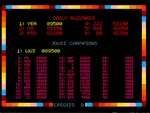
(68.44 KB
1307x986
)

I just got this highscore on joust. It's a kickass game, one of the best of its era for me. Williams made a lot of the more bullshitt-y arcade games that just want your money, but what sets this apart is that it's pure skill. On a secondary note, I'll add that the atari 2600 port of joust is also a great game in it's own right, with its own, more primitive sense of inertia that changes up how you play. It's worth checking out alongside the arcade original if you enjoy playing old ports like that.
>>144
Is that a dog man or is it a balding dude with a big nose?
MS1_M1_P...webm
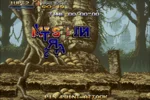
(35.38 MB
720x480
00:01:25)

Now we can upload gameplay footage, fucking nice. Here's some Metal Slug Gameplay
>>174
That was pretty intense.
>>181
Not really intense, just fast. The level itself is pretty easy, but to get max points I think you have to go sub 1:05 or 1:10, which is somewhat tight in comparison to the time requirement in later levels; for example I'm pretty sure requirement for max points on mission 3 is being sub 3:30, but my vaguely optimized run in the MS thread went 20 secs under that.
>>170
It's supposed to be a knight. How do you see that as a bald guy?
we_are_af...png

(317.65 KB
794x443
)

System Shock Remake will be released on 30th may this year. I waited for seven years. It was one of the best old games I ever played.
>>241
I didn't know it was getting a remake. I'll have to play the original first.
>>174
that's pretty epic gameplay
Metal gear solid snake for the MSX is totally badass. Its like resident evil with the resource management and the tactical stealth action is pretty damn fun. who even knew it was possible to do that in a pixel game? Metal gear was tedious, and the backtracking made me ragequit several times. solid snake is an upgrade 10 times over. Still playing though so i don't know if it'll go to hell later on but i highly doubt it.
What games for the ps1/2 do you gentlemen recommend? i plan on dusting off my old system and playing some games and games i should try and find but i'm curious on knowing what you guys like that wasn't mentioned in this thread already.
>>330
>PS1
>Alundra
>Castlevania Symphony of the Night
>Ape Escape
>Driver
>Drive 2
>Legacy of Kain: Soul Reaver
>MediEvil
>Strider 2
>PS2
>Devil May Cry (all of them)
>Maximo 1 and 2
>Mega Man X4
>Shinobi
>Kunoichi / Nightshade
>Prince of Persia: The Sands of Time
At least, those are the ones I have downloaded right now. There's probably more out there I haven't heard of or have forgotten
>>330
I really like konami's big ol bass games. They're essentially to fishing what neo turf masters is to golf in that they take a normally slow paced sport and turn it into an arcade style game. I've rarely, if ever seen them talked about which is a shame since they're definitely worth playing.
more PS1 recs: off world interceptor extreme, um jammer lammy, metal gear solid, apocalypse
ps2: Bombastic, godzilla save the earth, stretch panic, outrun 2, castle shikigami 2, the katamari games
>>330
For PS2 games I’ll add:
God Hand
Zone of the Enders 2
One of many Shin Megami Tensei games (I’d recommend either Persona 3 FES or Shin Megami Tensei Nocture, featuring Dante from the Devil May Cry series)
Also, don’t listen to >>335, Devil May Cry 1 and 3 are cool, but 2 is one of the worst games ever made, so please don’t actually try and seek a copy and pay real money for it.
>>330
Klonoa - cute 2.5d platformer
Okami - zelda-like with great art style
Gitaroo Man - rhythm game with great art style
I really like it when retro games have a hand drawn art style. some games that come to mind is mgs3, morrowind, and okami.
>MSG3
>Hand-drawn art style
Are you referring to the promo art or what?
>>99
3ds version of oricana is bullshit because there's this one game breaking bug that if you forget about it, or even fuck up one time then your memory is fucked and you lose all your progress and have to start a new game from scratch.
Golden dawn for the gameboy advance is really cool, the graphics and music are pretty good for a gba game and the story so far is pretty good.
The megaman zero games for the DS are difficult but really fun, and cool to boot.
Dude, if you like watercolor art in games you really ought to check out SaGa Frontier 2 Remastered. Tomomi Kobayashi really needs more of the love that Yoshitaka Amano used to get.
>>1200
I feel gba is slept on a lot. I just got into mario kart super circuit, one of my new favorites in the series. I should explore the system's library a bit more, but I'm well aware of how much shovelware there is to sift through, that and snes ports.
>>1242
The GBA was one of the system that made me fall in love with vidya games. When I play games from the system now it still has it magic for me. Retro GBA games are must play in my opinion.
Metal Slug Advance for the gba is addicting as fuck and both looks and performs pretty great. I'm a dumbass so i keep fucking myself over but there's no way i can put it down, i gotta make it to the end this time.




